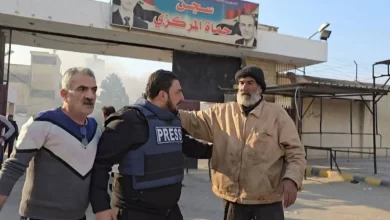Story 5

BEIRUT — The spark of hope that had ignited this week in the hearts of Lebanese families whose members had disappeared at the hands of the Syrian regime has now turned into a blaze. Syrian rebels, who announced the fall of Bashar al-Assad’s regime last night, also broke into several regime prisons, including the Sednaya prison on the outskirts of Damascus, described as a “human slaughterhouse.” Thousands of people emerged from these prisons, joining the prisoners previously released from the prisons of Hama, Aleppo, and Homs.
As emotions run high across the country and numerous videos of individuals being released from prisons and greeted by jubilant crowds have quickly spread on social media, a similar hope is emerging in Lebanon.
What do we know about Lebanese freed from Syrian prisons?
Last week, photos of at least one Lebanese detainee who had been released from the Hama prison prompted organizations following this case — often considered neglected, or even abandoned by Lebanese authorities — to meet and demand procedures to locate any Lebanese who could be freed from the regime’s prisons. The frenzy once again took over social media on Sunday.
Photos of emaciated men, some receiving medical treatment, quickly flooded the internet and activists have taken to social media to share lists of Lebanese individuals they believe have been released from Syrian prisons, compiling information from local groups and relatives.
“Moufid Habshi, Hana Keyrouz, Tony Kozah, Nabih Shallifa, Toufic Saadeh, Riad Geagea, Elias Rahmeh, Tannous Rahmeh, Massoud Rahmeh, Jean-Claude Khoury,” are among the names listed by Doumit Azzi Draiby in a post on X, noting that some had been imprisoned for “over 30 years” by the regime. The activist clarified to L’Orient Today that the list was compiled from data “published by the families and residents of the detainees’ villages.”
“Nothing is concrete yet,” warns Ammar Abboud, communications officer for the NGO ACT for the Disappeared, an initiative aimed at uncovering the identities of missing persons, which says it has been overwhelmed with calls from family members and loved ones. “When the chaos settles down, we will have more information,” he told L’Orient Today.
Wadad Halawani, head of the Committee of Families of the Kidnapped and Disappeared in Lebanon, who has fought for the truth about those who disappeared during the Lebanese Civil War and beyond said on Saturday, during a press conference in Beirut, that the news of detainees released from Syria brought a sense of cautious optimism to the families, some of whom were hoping to finally hear news of their loved ones.
“Today, our hearts are full of hope, but we need concrete information,” Halawani told reporters. “The release of detainees from Syrian prisons has rekindled a fire that has been burning for so many years.”
“We need the Lebanese state to take action now,” Halawani stressed, urging authorities to work swiftly to verify the identities of the released detainees. “We can’t afford to wait any longer.”
She called on anyone with information to contact the committee or the National Commission for the Missing and Forcibly Disappeared. Among the “confirmed cases,” she mentioned that of Ali Hassan al-Ali, who was arrested at a Syrian checkpoint in northern Lebanon when he was 18 and was released on Saturday night from the Hama prison.



